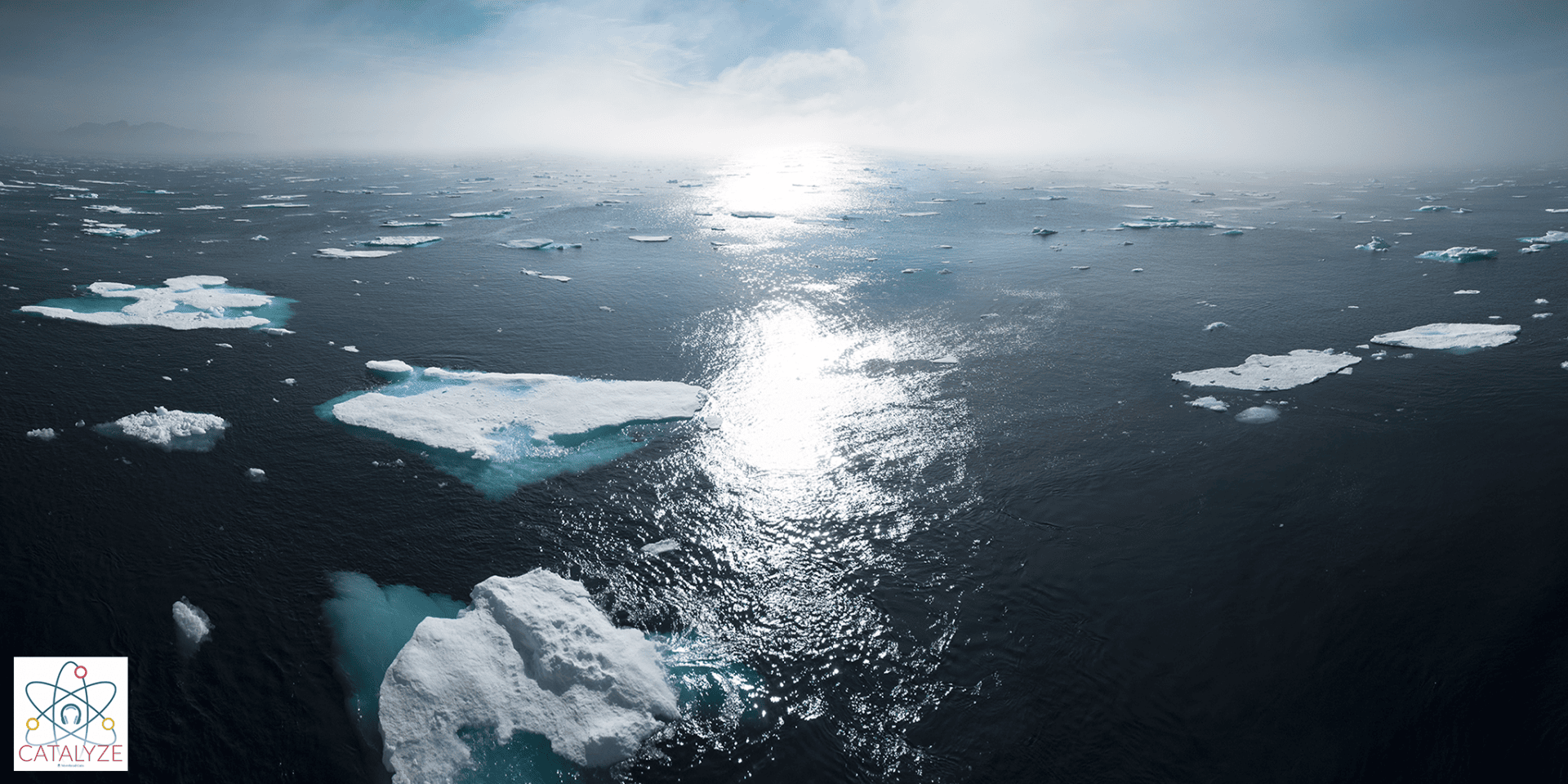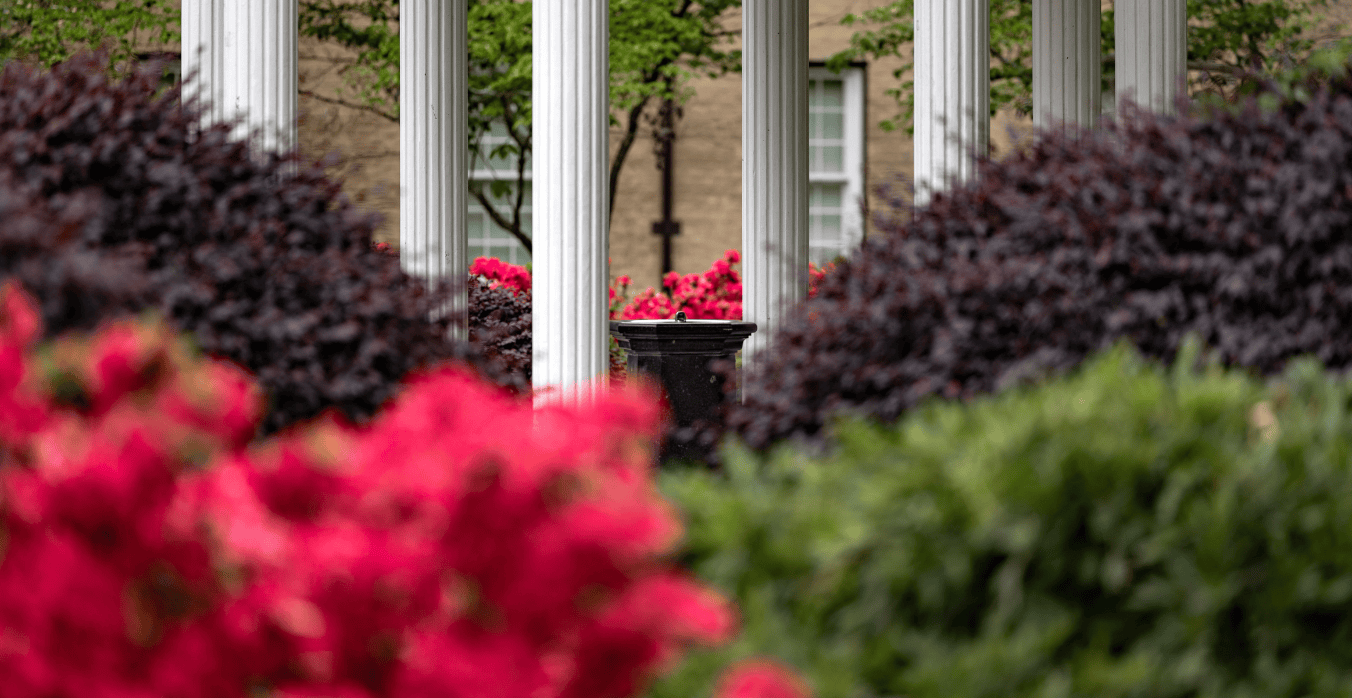
Photo by William Bossen via Unsplash
Upon his return from the 2021 United Nations Climate Change Conference (COP26) in Glasgow, Scotland, Billy Pizer ’90 joined Catalyze to analyze the major announcements made and new global carbon market rules. The economist also shares his thoughts on the role of technologies backing cryptocurrencies in emissions reporting and payments.
Billy is the vice president for research and policy engagement for Resources for the Future, a nonprofit research institution based in Washington, D.C. The alumnus worked in the U.S. Department of the Treasury as deputy assistant secretary for environment and energy.
Billy received his bachelor’s degree in physics as a Morehead-Cain Scholar at the University of North Carolina at Chapel Hill. He earned a combined master’s and PhD in economics from Harvard University in 1996.
Music credits
This episode features intro music by scholar Scott Hallyburton ’22, guitarist of the band South of the Soul.
How to listen
On your mobile device, you can listen and subscribe to Catalyze on Apple Podcasts or Spotify. For any other podcast app, you can find the show using our RSS feed.
Catalyze is hosted and produced by Sarah O’Carroll for the Morehead-Cain Foundation, home of the first merit scholarship program in the United States and located at the University of North Carolina at Chapel Hill. You can let us know what you thought of the episode by finding us on social media @moreheadcain or you can email us at communications@moreheadcain.org.
Episode Transcription
(Sarah)
Billy, thanks for joining us.
(Billy)
Thank you. I’m happy to be here.
(Sarah)
In reading about the conference, it seems like it was very chaotic at times, with protestors outside and all of the announcements happening. There were major players there. Can you give us a sense of what it was like to be there and who you saw? I don’t want to celebritize the event, of course, but are there any vignettes that stood out to you from experiencing one of the biggest events that’s been held for international leaders during the pandemic?
(Billy)
Yeah, so it’s probably worthwhile to recognize that these negotiations have been going on for almost thirty years. The original Framework Convention was signed at the Rio summit in 1992, and it’s really changed over the years into an event centered on the negotiations to an event that is partly about the negotiations and is partly about all these other things that are happening concurrently.
When you’re there and when you’re looking at it, it does seem very chaotic because there is this international negotiation, and there are these government officials who are working very hard to get an agreement on somewhat technical issues and arguing over language. And then, meanwhile, there are all these announcements, and you’re trying to make sense of how important the announcements are, and then there are the protests.
So, it does seem pretty chaotic, but at the core of it, as I just said, are three things. There is all the protest and attention on the importance of the issue and the inadequacy at some level of what is being done, given how serious we think the problem is. On another level, there is this methodical progress to put the rules in place and follow up on what needs to be done on the agreement itself. And then there are all these non-state actors or non-negotiated outcomes that are being announced at the same time. I guess you could describe it as a three-ring circus because there’s three different things that are going on but they’re all going on at the same time, and they’re all important, I think, for the outcome.
(Sarah)
You mentioned some of the less official agreements that come out of this. Sometimes, it seems difficult to parse out among the announcements that emerge which truly bear weight and which are meant to just sort of make a splash in the news to help a country or politician. Starting with the international agreements that resulted from the summit—including between the U.S. and China on emissions, between hundreds of countries on deforestation and reducing methane, and India’s commitment to reach net zero as well—can you lay out for us the biggest headlines, according to your perspective from having been there?
(Billy)
Yeah, there’s some beauty pageant sort of notion to this, that people are making announcements to have a splash, certainly. But they are an opportunity for accountability, and that accountability hinges on third parties, at least if it’s not a negotiated outcome. If it’s a negotiated piece, then there’s a process within the official U.N. mechanism to hold people accountable, and we can talk about that.
But it’s really going to be third parties—NGOs or other organizations—that go back and see: did the countries, did the organizations that were announcing actions, do what they said they were going to do? So, it’s not so much what happened on the Friday before the COP ended; it’s what happens on the Monday afterwards, when people need to be going home and starting to implement the things they said they were going to do.
I do think you’re right to wonder about that. I think in terms of some of the more significant things, certainly, the deforestation announcement struck me as significant. The methane announcement seems significant. Something like India’s net-zero commitment? I mean, these net-zero commitments are further in the future, and so it’s hard to really hold people accountable for something that is not really set to come do for thirty years. But I think you can legitimately ask the countries, “Well, you said you were going to do this. What are you doing to move in that direction?” I think all of these announcements are hooks for organizations to try to hold the parties accountable.
(Sarah)
Of course, the next time for that to happen (a natural one, at least) would be the next conference, but can you share what other structures there are to help countries and organizations be accountable and to make sure that they are following timelines so that we don’t get to 2070 having not made much progress?
(Billy)
Well, it’s important to recognize, first of all, the challenges that an international effort face, just right off the bat. I think for those of us who are used to living in the United States, where, in theory, we pass laws and we decide as a society we’re going to do things and then, if you don’t do them, you get sued. The governments can get sued for not executing on the laws that the legislative bodies have passed. So there’s a very high level of accountability within a national system for the legal commitments that are made.
Internationally, that’s much, much trickier. In the olden days—by which, I mean, like, twenty years ago—there was a desire to have agreements that stipulated targets and that countries were, in theory, legally obligated to achieve. And if they didn’t meet those targets, they were out of compliance with an agreement that they had made. And there were mechanisms in place to try to get them back into compliance.
We’re now in this world where I think we’ve recognized that that doesn’t really work. The number of countries that were willing to participate in that agreement, the Kyoto Protocol, was really quite limited. The United States was never a party to it. China was never a party to it. So that mechanism didn’t work.
We’re left with this mechanism that is all about getting people to commit to stuff and trying to shine a light on it. The mechanism within the formal U.N. process is a review of basically whether people did what they said they were going to do. That’s kind of the review process. There’s no being out of compliance if you didn’t do it but there is a requirement to report what you did. That was kind of the balance that was struck in Paris. People are required to pledge; they’re required to be reviewed, but they’re not required to actually fulfill the obligation.
And then similarly, other organizations—third parties, NGOs—create mechanisms by which they not only evaluate whether the countries are doing what they said they were going to do, which is kind of a more basic sort of evaluation, but the deeper question of whether or not countries are doing what they really need to be doing, given the seriousness of the problem. That, really, at a national level even, is not part of the agreement.
There is what’s called a global stock take that will happen next year, where collectively all the actions are reviewed and they’ll come to the conclusion that it’s inadequate. But just by its nature, the parties to the Paris Agreement, were not willing to undergo external scrutiny, officially, about the adequacy of their pledge or what they plan to do. So that’s left entirely to third parties.
(Sarah)
I’m curious to know how transparent these plans are in terms of the cost, how they’ll actually work financially. Can you any takeaways from studying economics and from that perspective?
(Billy)
That’s a big part of what Resources for the Future (where I work) does, is try to figure out what different policies are likely to achieve in terms of emission reductions, what they’re likely to cost, and who’s going to bear that cost. So these are really bread-and-butter questions for me and people like me at RFF.
So, I think the answer to your question is that the kinds of near-term activities that countries have put on the table generally are achievable, affordable, without significant economic disruption. You look at what the United States put on the table in terms of 50 percent to 52 percent below 2005 levels by 2030, or you look at what the EU put together in terms of its 55 percent reductions.
These targets are achievable. They will cost some money, probably. Tere will be opportunities for businesses and people who are working on the clean energy side that is growing and expanding, and there will be cost to the communities that are on the fossil side that are contracting. I think the idea is that with a renewed emphasis on equity and distributional consequences in justice, we need to be very attentive to that distributional consequence and make sure we take care of those communities.
But the aggregate costs are not . . . I don’t think people see those as harmful to economic growth. If the economy is going to (on average) grow a few percentages per year, per capita, over a period of a decade, you have a fraction of a percent of costs. That is still a richer and more affluent society in 2030, they’ve just spent a little bit more money on reducing their emissions.
(Sarah)
I was also reading about the global carbon market rules that came out from different delegates during the conference. Do you know which countries that will most impact and who it might most help?
(Billy)
It’s a great question. So, in the formal negotiations, a lot of the focus was these rules about how countries, once they make these pledges and emission commitments that they’ve made under the Paris Agreement, can they trade them? Can a country that beats its commitment help a country that is missing its commitment? So collectively, together, they jointly meet their commitments. That was the whole notion of this piece of the negotiation. It was successful in terms of them getting a deal.
I think who it helps really depends on one really big question. It depends on where the countries who are having trouble meeting their obligation or want to help by supporting reductions in other countries—where are they willing to turn to invest and purchase reductions in other countries? And the agreement provides the mechanism to do that. It doesn’t say where countries will actually invest.
If we look back at what happened with some of the older examples of this, I mentioned the Kyoto Protocol, and it excluded the United States and China, but it included Europe. Where did Europe turn to buy its emission reductions abroad that it used?
So, two places they turned. One was to poor countries. So I think there was a reluctance to trade with countries that didn’t have very ambitious targets unless they were poor countries. One winner, I think, is probably poorer countries that can now do some emission reductions and sell tho0se to richer countries trying to meet their goals. The other place that helps is when you have a collection of countries like the European Union who have a trading system and other countries want to join that trading system. This provides kind of a seamless way for that to happen. But that’s probably not the biggest place.
The expansion of linkages between trading systems—I think it’s a great opportunity. We just haven’t seen that much of it, but that would be the other place.
(Sarah)
This question might be a bit out of left field, but is there an increasing role for cryptocurrency in the conversation about the environmental crisis and global economies? Where does cryptocurrency fall in all of this?
(Billy)
It’s an interesting question. This is an international regulatory system, and there’s a centralized registry, and when countries trade obligations, it needs to be reported in a central registry to make sure that countries are fulfilling their obligations. And we know if one country is going to do more, the other country is going to do less, and vice versa. So it’s not as much of a role for decentralized accounting in that sort of system.
In terms of payments, I don’t know if countries would want to be paid in cryptocurrencies instead of traditional currencies, but certainly that would be potentially one angle.
The place where I had an interesting conversation with someone was, if countries wanted to be able to report their aggregate emissions with a lot of detail underlying it, but they didn’t want the detail necessarily revealed, you could use some of these technologies for them to report their aggregate emissions, along with encrypted information about the disaggregated emissions.
And there would be a way to verify that the numbers added up and made sense without them having to reveal what might be viewed as more detailed, proprietary, and stuff they didn’t necessarily want to share. So, there may be some applications in here, but I don’t think it’s quite as broad as some people might think.
(Sarah)
That’s somehow relieving. I guess because I don’t really understand blockchain technology but it feels like it’s coming fast. It’s interesting to hear how that would practically look like for countries who are seeking to pay or buy from each other.
(Billy)
Yeah, it doesn’t jump out at me that it has a huge role. Like I said, I think in the main emissions trading world, it is actually very centralized because it’s a regulatory system, and blockchain technology tends to work well in places where people for one reason or another want something decentralized.
(Sarah)
So bringing us back to looking at the conference and its outcomes as a whole, did we succeed in trying to reinvigorate this commitment to getting 1.5 degrees Celsius in check? Will we be able to keep that goal given the timelines mentioned or what is more reasonable?
(Billy)
The success of the negotiations or the COP meetings have to be . . . to me, I view it through the lens of, are we leveraging as much action as possible? Is there an architecture or a way we could redesign the way we’re doing things to get countries to do more, recognizing that at some fundamental level, it comes down to countries or other groups of actors taking action themselves. There’s not like an action the international community is going to take that’s going to do more than simply try to leverage the action by the actual people that make the decisions, the governments, and the companies, and the other stakeholders.
I think in that regard, it’s working the way it was intended to work. By kind of having these regular repeated meetings where the bright lights are on and everybody is kind of under scrutiny to both announce what they’re going to do as well as come clean about what they are doing. I think that’s working. It’s never as much as what the protesters want or maybe the science demands but I think we are leveraging the system to get as much as we can.
In terms of 1.5 degrees, I think that has always been a very difficult target to imagine reaching. Even though I think right now we’re at about one-point something degrees of change, if you took away pollution and all the things that are cooling the earth, you would actually be at 1.5. So I look at 1.5 as something that at this point we almost have to go back to. But I think two degrees, which seemed impossible to me ten years ago, actually seems like there’s some probability we might be able to do that with some very aggressive action. 1.5 alive is really tough. I think two degrees? Possible. It’s going to require some major lifts, and it’s going to really require countries around the world to step up in meaningful ways.
(Sarah)
This is a more personal question. As someone who has worked in climate policy for the breadth of your career, you just are constantly faced by depressing facts. How do you personally cope with knowing that consequences are often going to be dire? I’m not asking for some “feel good advice” to end the episode, necessarily, but just curious what that looks like. Are you able to detach from it or how else do you manage that?
(Billy)
It’s an interesting question. I would say that if you look around the world, there are always horrible things going on. And to some extent, living in the United States is a bit of a luxury, that you can distract yourself from that. You can have a good lifestyle and live comfortably and not have to confront it unless you read the paper. But you don’t have to read the paper about climate change, and you didn’t need the climate crisis to be aware that there are a lot of horrible things going on around.
I think what’s different about climate change is that it’s becoming more palpable in the United States. We have wildfires, we have floods, we can see the impacts in a way that maybe we didn’t see them twenty years ago. And so, yeah, it’s definitely scary. And there is a certain amount of mental taxation to realize that this is going to be a world that our kids are going to inherit that may be likely to be less pleasant.
Meanwhile, there are a lot of other things that are happening that are still positive. I mean, we’re inventing things and figuring out ways to do things that hopefully will ameliorate the adverse impacts that we’re facing, and hopefully we’ll find technologies that will allow us to undo some of these consequences: removing CO2 from the atmosphere or doing other things that hopefully will let us cope with what’s going to happen.
So I guess, this is definitely not the feel good answer . . . but I do feel like for all the problems, whether it’s climate change or conflicts around the world and unjust governments, the challenge is always to use your life in the ways you can to effect change. And it’s great that younger people now see this issue as a defining one or are focused on it because, for a long time, it kind of languished. I’ve been working on it for twenty-five years, and it’s felt like it was not popular in the sense that most people thought and cared about it in the same way they have– over the last five or ten years.
There’s a lot to be done, and there’s a lot we can do. And I think we shouldn’t focus on there being an absolute threshold of success and failure. I think every little bit that we do is going to be helpful. And so we shouldn’t lament that we’re not going to get to 1.5 degrees, because if we got two degrees, that would be a phenomenal achievement, and the world would be much better for a lot of people if we could do that. So I think it’s just important to realize that every little bit is important, and even if we’d gotten to 1.5, it would have been better if we could have gotten to 1.4 for some people. So I think these targets are useful devices, but we can’t get too hung up on them.
(Sarah)
Billy, thank you so much. Is there anything else you’d like to add?
(Billy)
People live in a lot of different places and they have different jobs and they have different roles they play in solving this and every other problem that society faces. It is challenging, but I think the important thing is to look for the opportunities you have to make a difference where you can make a difference. The people you vote for, the actions you take every day and the signals you give to your friends and family and children. And I think the more we do that in a constructive way about climate change and everything else, the better the better things are going to get well.
(Sarah)
Billy, I hope you have a great rest of your week. And thanks again for joining Catalyze.
(Billy)
Sure. Totally my pleasure. I really enjoyed this.
*This episode has been edited slightly for clarity.


